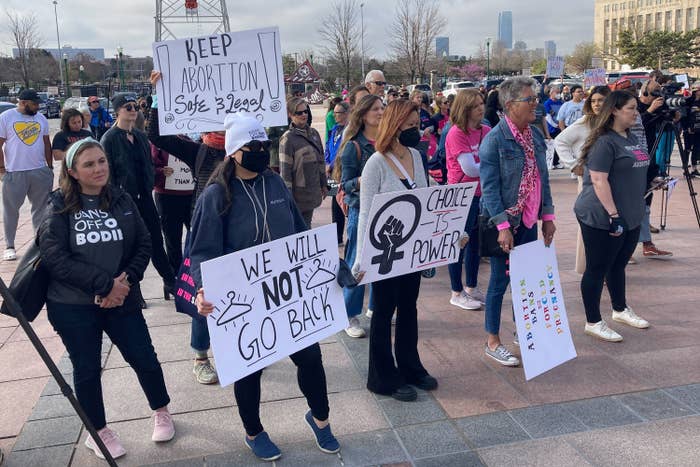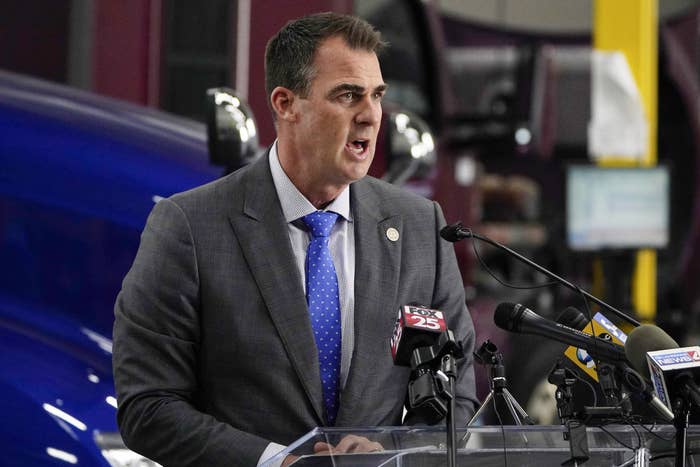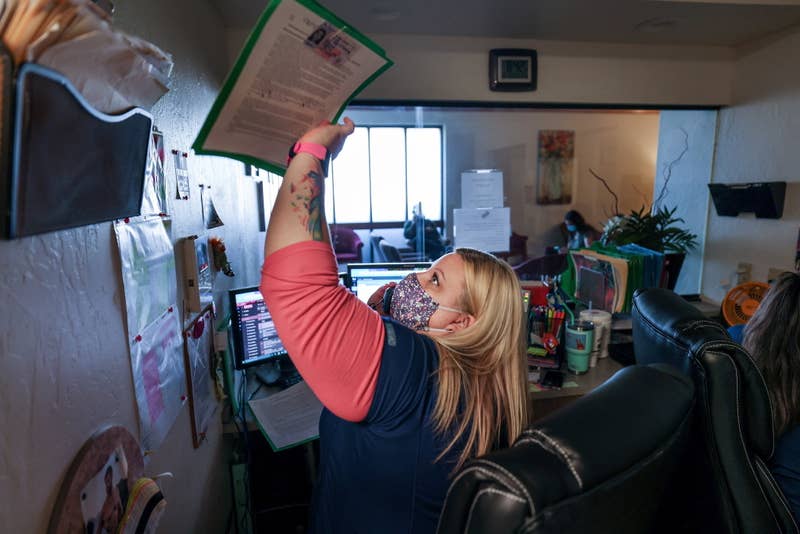Oklahoma’s New Abortion Ban Shows How Precarious Reproductive Rights Are
"We don't really know what would happen to laws like this, but it could absolutely be the case that laws like this are legal post-Dobbs."
Stephanie K. Baer
BuzzFeed News Reporter
"We don't really know what would happen to laws like this, but it could absolutely be the case that laws like this are legal post-Dobbs."
Stephanie K. Baer
BuzzFeed News Reporter
April 12, 2022, 
Sean Murphy / AP
Abortion rights advocates gather outside the Oklahoma Capitol on April 5, 2022.
Oklahoma Gov. Kevin Stitt on Tuesday signed into law legislation banning nearly all abortions at any point during pregnancy — a flagrant violation of Roe v. Wade, the landmark Supreme Court ruling that made the procedure legal nationwide 50 years ago.
The Oklahoma law, one of the harshest abortion bans enacted since Roe, will likely be blocked by the courts — for now — because states cannot ban abortion before a fetus can survive outside the womb. But it shows how precarious reproductive rights in the US have become and how emboldened anti-abortion lawmakers already are as the country waits for the Supreme Court's decision in Dobbs v. Jackson Women’s Health Organization, the biggest challenge to abortion rights in decades. In that case, which will be decided in the coming weeks or months, the state of Mississippi is calling on the justices to overturn Roe and uphold its previability ban. If the court does either — or both — even extreme laws like Oklahoma's could become constitutional.
"We don't really know what would happen to laws like this, but it could absolutely be the case that laws like this are legal post-Dobbs," Aziza Ahmed, a law professor at the University of California, Irvine, told BuzzFeed News.
Under Oklahoma's law, performing an abortion would be a felony punishable by up to 10 years in prison and a fine of up to $100,000. The only exception to the ban is in the case of a medical emergency in which the life of the pregnant person is in danger.
If it is not blocked by the courts, the law will take effect 90 days after the state legislature adjourns at the end of May.
Nancy Northup, president and CEO of the Center for Reproductive Rights, which is representing Mississippi's last clinic in the Dobbs case, said on Tuesday that the organization planned to sue Oklahoma to stop this law from taking effect.
“Oklahoma’s total abortion ban is blatantly unconstitutional and will wreak havoc on the lives of people seeking abortion care within and outside the state," Northup said in a statement. "We’ve sued the state of Oklahoma ten times in the last decade to protect abortion access and we will challenge this law as well to stop this travesty from ever taking effect.”

Sue Ogrocki / AP
Oklahoma Gov. Kevin Stitt speaks during a news conference in Oklahoma City on May 17, 2021.
For years, laws like Oklahoma's and other previability bans have been struck down by the courts because under Roe and Planned Parenthood v. Casey — the 1992 ruling that said restrictions cannot place an “undue burden” on access — states cannot ban abortion before the point of viability, which is usually around 24 weeks. In 2016, then–Oklahoma governor Mary Fallin vetoed a similar bill that would have made performing abortions punishable by up to three years in prison, saying it wouldn't survive a legal challenge.
But with Donald Trump's election in 2016, anti-abortion activists were able to get the issue back in front of the Supreme Court, which now has a 6–3 conservative majority. And since the justices allowed Texas's six-week ban to take effect last year and indicated during Dobbs arguments that they may be open to overturning Roe or at least chipping away at the viability line, conservative lawmakers have rushed to pass new abortion bans and restrictions.
Despite the wave of anti-abortion legislation making its way through statehouses across the South and the Midwest, the passage of Oklahoma's bill last week caught some observers off guard. The bill, which was passed by the state Senate last year, was added to the state House of Representatives agenda on April 4. It passed the next day in a 70–14 vote with no debate.
What makes Oklahoma's law so extreme is that it prohibits abortions "from conception," as its author, Republican state Sen. Nathan Dahm, proudly said in a tweet, and it also threatens severe penalties for performing the procedure.
"Even the Texas law allows abortions up to six weeks, and by outlawing it entirely and creating criminal penalties for physicians we're basically in the pre-Roe era," Ahmed said, adding that even with the exception, providers will likely be hesitant to perform the procedure out of fear of being criminally punished.
"Needless to say, this is not a good environment in which to provide reproductive healthcare," she said.
And although the law specifically states that a pregnant person cannot be charged "with any criminal offense in the death of her own unborn child," advocates and experts don't trust that officials won't arrest or prosecute people who self-manage their abortions. In Texas, a 26-year-old woman was recently arrested and charged for being involved in a "self-induced abortion." She was later released and prosecutors acknowledged she did not violate any laws.
"Maybe as the laws stand they won't criminalize people who have abortions, but that doesn't mean they won't add it later," said Renee Bracey Sherman, founder and executive director of the reproductive justice nonprofit group We Testify. "The anti-abortion movement also used to say we don’t want to criminalize abortion, we just want to make it safer. I mean, that was a fucking lie, right?"

Evelyn Hockstein / Reuter
Patient care coordinator Jennifer Reince answers nonstop phone calls at the Trust Women clinic in Oklahoma City on Dec. 6, 2021.
The signing of Oklahoma's law comes at a time when the state's four abortion clinics have been overwhelmed by patients traveling from Texas. Since SB 8 took effect in September, Oklahoma has provided abortions to 45% of Texans who have sought care elsewhere, more than any other state, according to a recent report by the Texas Policy Evaluation Project at the University of Texas at Austin.
Bracey Sherman called the timing of Oklahoma's bill "super, super cruel" in light of the increased demand for abortion care from residents of its neighboring state.
"Oklahoma saw that they were becoming a place where Texans were seeking out abortions, and instead of welcoming and supporting them, just said, 'OK, great, we’re going to turn you away,'" Bracey Sherman told BuzzFeed News. "I'm sorry, what kind of anti-Christian ... being turned away at the end story is that? It's just wild."
Texas and Oklahoma are also among 13 states that have passed so-called trigger bans, which are designed to take effect immediately or through quick state action if Roe falls. But if the 1973 ruling isn't explicitly overturned, Oklahoma's new law gives legislators a chance to test how far they can go to ban abortion entirely, said Tamya Cox-Touré, executive director of the ACLU of Oklahoma and cochair of the Oklahoma Call for Reproductive Justice.
"I can only assume it's a matter of them trying to do everything they can to ensure that abortion access is denied in Oklahoma," Cox-Touré told BuzzFeed News.

Stephanie Baer is a reporter with BuzzFeed News and is based in Los Angeles.
Contact Stephanie K. Baer at stephanie.baer@buzzfeed.com.

Sean Murphy / AP
Abortion rights advocates gather outside the Oklahoma Capitol on April 5, 2022.
Oklahoma Gov. Kevin Stitt on Tuesday signed into law legislation banning nearly all abortions at any point during pregnancy — a flagrant violation of Roe v. Wade, the landmark Supreme Court ruling that made the procedure legal nationwide 50 years ago.
The Oklahoma law, one of the harshest abortion bans enacted since Roe, will likely be blocked by the courts — for now — because states cannot ban abortion before a fetus can survive outside the womb. But it shows how precarious reproductive rights in the US have become and how emboldened anti-abortion lawmakers already are as the country waits for the Supreme Court's decision in Dobbs v. Jackson Women’s Health Organization, the biggest challenge to abortion rights in decades. In that case, which will be decided in the coming weeks or months, the state of Mississippi is calling on the justices to overturn Roe and uphold its previability ban. If the court does either — or both — even extreme laws like Oklahoma's could become constitutional.
"We don't really know what would happen to laws like this, but it could absolutely be the case that laws like this are legal post-Dobbs," Aziza Ahmed, a law professor at the University of California, Irvine, told BuzzFeed News.
Under Oklahoma's law, performing an abortion would be a felony punishable by up to 10 years in prison and a fine of up to $100,000. The only exception to the ban is in the case of a medical emergency in which the life of the pregnant person is in danger.
If it is not blocked by the courts, the law will take effect 90 days after the state legislature adjourns at the end of May.
Nancy Northup, president and CEO of the Center for Reproductive Rights, which is representing Mississippi's last clinic in the Dobbs case, said on Tuesday that the organization planned to sue Oklahoma to stop this law from taking effect.
“Oklahoma’s total abortion ban is blatantly unconstitutional and will wreak havoc on the lives of people seeking abortion care within and outside the state," Northup said in a statement. "We’ve sued the state of Oklahoma ten times in the last decade to protect abortion access and we will challenge this law as well to stop this travesty from ever taking effect.”

Sue Ogrocki / AP
Oklahoma Gov. Kevin Stitt speaks during a news conference in Oklahoma City on May 17, 2021.
For years, laws like Oklahoma's and other previability bans have been struck down by the courts because under Roe and Planned Parenthood v. Casey — the 1992 ruling that said restrictions cannot place an “undue burden” on access — states cannot ban abortion before the point of viability, which is usually around 24 weeks. In 2016, then–Oklahoma governor Mary Fallin vetoed a similar bill that would have made performing abortions punishable by up to three years in prison, saying it wouldn't survive a legal challenge.
But with Donald Trump's election in 2016, anti-abortion activists were able to get the issue back in front of the Supreme Court, which now has a 6–3 conservative majority. And since the justices allowed Texas's six-week ban to take effect last year and indicated during Dobbs arguments that they may be open to overturning Roe or at least chipping away at the viability line, conservative lawmakers have rushed to pass new abortion bans and restrictions.
Despite the wave of anti-abortion legislation making its way through statehouses across the South and the Midwest, the passage of Oklahoma's bill last week caught some observers off guard. The bill, which was passed by the state Senate last year, was added to the state House of Representatives agenda on April 4. It passed the next day in a 70–14 vote with no debate.
What makes Oklahoma's law so extreme is that it prohibits abortions "from conception," as its author, Republican state Sen. Nathan Dahm, proudly said in a tweet, and it also threatens severe penalties for performing the procedure.
"Even the Texas law allows abortions up to six weeks, and by outlawing it entirely and creating criminal penalties for physicians we're basically in the pre-Roe era," Ahmed said, adding that even with the exception, providers will likely be hesitant to perform the procedure out of fear of being criminally punished.
"Needless to say, this is not a good environment in which to provide reproductive healthcare," she said.
And although the law specifically states that a pregnant person cannot be charged "with any criminal offense in the death of her own unborn child," advocates and experts don't trust that officials won't arrest or prosecute people who self-manage their abortions. In Texas, a 26-year-old woman was recently arrested and charged for being involved in a "self-induced abortion." She was later released and prosecutors acknowledged she did not violate any laws.
"Maybe as the laws stand they won't criminalize people who have abortions, but that doesn't mean they won't add it later," said Renee Bracey Sherman, founder and executive director of the reproductive justice nonprofit group We Testify. "The anti-abortion movement also used to say we don’t want to criminalize abortion, we just want to make it safer. I mean, that was a fucking lie, right?"

Evelyn Hockstein / Reuter
Patient care coordinator Jennifer Reince answers nonstop phone calls at the Trust Women clinic in Oklahoma City on Dec. 6, 2021.
The signing of Oklahoma's law comes at a time when the state's four abortion clinics have been overwhelmed by patients traveling from Texas. Since SB 8 took effect in September, Oklahoma has provided abortions to 45% of Texans who have sought care elsewhere, more than any other state, according to a recent report by the Texas Policy Evaluation Project at the University of Texas at Austin.
Bracey Sherman called the timing of Oklahoma's bill "super, super cruel" in light of the increased demand for abortion care from residents of its neighboring state.
"Oklahoma saw that they were becoming a place where Texans were seeking out abortions, and instead of welcoming and supporting them, just said, 'OK, great, we’re going to turn you away,'" Bracey Sherman told BuzzFeed News. "I'm sorry, what kind of anti-Christian ... being turned away at the end story is that? It's just wild."
Texas and Oklahoma are also among 13 states that have passed so-called trigger bans, which are designed to take effect immediately or through quick state action if Roe falls. But if the 1973 ruling isn't explicitly overturned, Oklahoma's new law gives legislators a chance to test how far they can go to ban abortion entirely, said Tamya Cox-Touré, executive director of the ACLU of Oklahoma and cochair of the Oklahoma Call for Reproductive Justice.
"I can only assume it's a matter of them trying to do everything they can to ensure that abortion access is denied in Oklahoma," Cox-Touré told BuzzFeed News.

Stephanie Baer is a reporter with BuzzFeed News and is based in Los Angeles.
Contact Stephanie K. Baer at stephanie.baer@buzzfeed.com.
Nicole Fallert · March 9, 2022
Nicole Fallert · Feb. 18, 2022
Stephanie K. Baer · Dec. 1, 2021
Stephanie K. Baer · Nov. 29, 2021
No comments:
Post a Comment